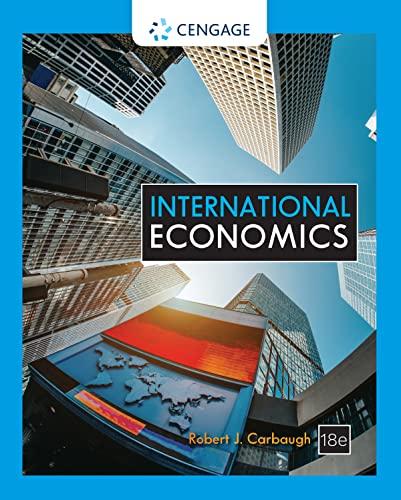Many scientists consider carbon dioxide to be a contributor to global warming. This colorless, odorless gas is
Question:
Many scientists consider carbon dioxide to be a contributor to global warming. This colorless, odorless gas is released into the environment whenever oil, coal, and other fossil fuels are burned. Among the policies to reduce the consumption of fossil fuels are annual limits placed on the number of tons of a pollutant that a firm can emit into the atmosphere and a tax placed on each ton of pollutant that a firm emits. These policies especially raise the cost of pollution for carbon dioxide-intensive industries such as steel, aluminum, chemicals, paper, and cement. The issue of economic competitiveness has been a sticking point in global negotiations to reduce emissions. If the United States independently raises the penalty for
carbon dioxide emissions by imposing emission caps or taxes, its producers will be at a competitive disadvantage because the cost of regulating carbon dioxide will be embodied in the overall price of goods-increasing costs relative to goods produced in countries with little or no carbon dioxide regulations. Instead of paying these higher costs, U.S. firms might relocate to countries with lower pollution enforcement standards, thus costing Americans jobs while failing to decrease global emissions.
One way to protect American firms would be to place a "carbon tariff" on goods that are imported from nations that have less strict regulations to limit their carbon dioxide emissions. Presumably, the tariff would be higher on imports from polluting nations such as China than on imports from energy-efficient Brazil. Proponents of carbon tariffs maintain that by increasing the price of imported goods, a tariff would protect domestic industries from the competitive disadvantage they incur when adhering to pollution regulations. They also contend that a carbon tariff provides an incentive for other countries to enact pollution regulations.
There are several arguments against imposing a carbon tariff. First, this sort of tariff would be hard to implement because of lack of knowledge about the carbon dioxide content of imports. Customs officials would have to know precisely how much steel is in each automobile and where and how every bit of that steel is produced, which would be a difficult task. An automobile from Indonesia made of steel imported from energy-efficient Germany should presumably be taxed at a different rate than the same Indonesian model made of steel from energy-inefficient China. This would be tough.
Another argument against enacting carbon tariffs is that they might result in a trade war with damaging effects for domestic industry: They target developing countries whose cooperation is essential for global climate policy. The legitimacy of carbon tariffs under the rules of the World Trade Organization (WTO) is uncertain. The principle of free trade, as promoted by the WTO, suggests that countries should make goods that embody their comparative advantage. Imposing a carbon tariff to discourage carbon-intensive producers works against the principle of comparative advantage for countries such as China and India that would likely challenge it at the WTO. Carbon tariffs might be found to be illegal by the WTO, depending on how they are implemented. Indeed, there are many practical and political complexities of implementing carbon tariffs. It remains to be seen whether they will become a major part of global climate policy.
What do you think? Do you feel that carbon tariffs should be placed on imported goods?
Step by Step Answer:






